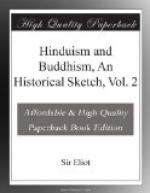[Footnote 397: Bhag.-gita, XL. 23-34.]
[Footnote 398: See Srisa Chandra Vasu, Daily practice of the Hindus, p. 118.]
[Footnote 399: II. 1 and I. 1.]
[Footnote 400: See Maitrayana Up. V. 2. It is highly probable that the celebrated image at Elephanta is not a Trimurti at all but a Mahesamurti of Siva. See Gopinatha Rao, Hindu Iconog. II. 382.]
CHAPTER XXVI
FEATURES OF HINDUISM: RITUAL, CASTE, SECT, FAITH
1
In the last chapter I traced the growth of the great gods Siva and Vishnu. The prominence of these figures is one of the marks which distinguish the later phase of Indian religion from the earlier. But it is also distinguished by various practices, institutions and beliefs, which are more or less connected with the new deities. Such are a new ritual, the elaboration of the caste system, the growth of sects, and the tendency to make devotion to a particular deity the essence of religion. In the present chapter I shall say something of these phenomena.
Hinduism has often and justly been compared to a jungle. As in the jungle every particle of soil seems to put forth its spirit in vegetable life and plants grow on plants, creepers and parasites on their more stalwart brethren, so in India art, commerce, warfare and crime, every human interest and aspiration seek for a manifestation in religion, and since men and women of all classes and occupations, all stages of education and civilization, have contributed to Hinduism, much of it seems low, foolish and even immoral. The jungle is not a park or garden. Whatever can grow in it, does grow. The Brahmans are not gardeners but forest officers. To attempt a history or description of Indian creeds seems an enterprise as vast, hopeless and pathless as a general account of European politics. As for many centuries the life of Europe has expressed itself in politics, so for even longer ages the life of India, which has more inhabitants than western Europe,[401] has found expression in religion, speculation and philosophy, and has left of all this thought a voluminous record, mighty in bulk if wanting in dates and events. And why should it chronicle them? The truly religious mind does not care for the history of religion, just as among us the scientific mind does not dwell on the history of science.




